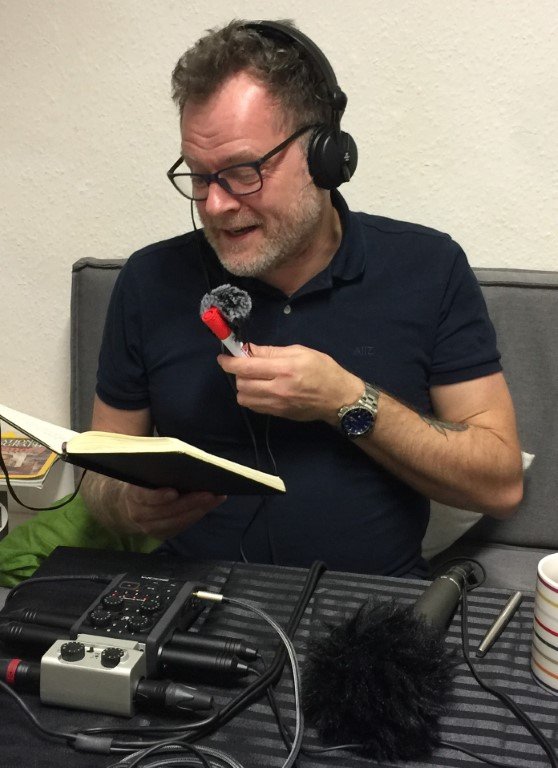
One of the worries about the present anxiety of the spread of the coronavirus is that we don't know where and when we might be infectious or infected. That's why it is essential to follow the advice of the medical professionals and take as much action as possible to reduce social contact, so we can slow down the rate at which the virus is spread. This will help the healthcare services to manage the treatment of people who are affected by the virus, and ensure that intensive care units remain operational both for new patients, and for people with existing treatments.
Making a podcast is a trivial matter in comparison to the potential danger to public health. That's why for the next few weeks or months, John and I have agreed to suspend the recording of the Decentered Media podcast recordings that we usually undertake on Tuesdays at the Documentary Media Centre. It's one less pressure to worry about.
The alternative option, of recording online, however, has become much easier to achieve, as the streaming and video conferencing systems like Skype, Zoom, Google Hangouts and Cleanfeed have become more widespread and accessible. We know that many more people are now going to be working from home over the next few weeks and months, and that the will be speaking with colleagues via webinars and videoconference meetings. So it's not going to be much of a problem to record and share conversations for a podcast using these techniques.
A couple of things I would recommend when doing video or audio calls and conferencing from home:
Use headphones and a microphone. While the signal processing on Skype, for example is excellent, it has to work extra hard to cancel out the echo-voice which comes through from the speakers. It feels like magic sometimes that we can talk and listen from a phone or a laptop, but this is dependent on the noise-processing that the system uses. If you wear headphones it doesn't have to work so hard.
Use a close microphone rather than rely on the inbuilt microphone of the devise. Phones and laptops are generally designed to process voice audio, but if they have to compete with extraneous noises from humming fans, echoey spaces or people, then they have to work much harder, and you get more drop-outs. If you use an external microphone that you can position a couple of inches from the mouth, then you can take the recording gain input level down, and it will reduce the background sounds. Don't forget to clean the microphone if other people will be using it. I've found that cabled headphones with mics for phones are pretty good these days, and you can hold the microphone closer if you need to. These mics are designed to pick up from 360 degrees, so be aware of my next point.
Find a calm and quiet place to sit. Somewhere with soft furnishings, like a bedroom, would be best for audio, though you might want to tidy-up if you are recording video. Hard surfaces create echoes and make it difficult to distinguish what is said. You should also be sitting in a fixed position, rather than moving about. This helps to maintain the consistency of the audio so that people have time to get used to it and adjust to it. If you change the place, then the audio changes as well. Don't think that you can multitasks and do other jobs while you are talking with other people. The noises are distracting and your collaborators will appreciate your undivided attention.
The most important thing is to try out recoding your audio capture first, and then listen back to it. Try to note how the extraneous sounds would feel to someone else. Perhaps don't listen back to it in the same place. Try a different room, and a different set of headphones, just to get a sense of what other people might be hearing.
I have a reasonable audio input on my desktop workstation, but it's not perfect. I get frustrated with traffic sounds and people walking past my house, especially if they stop. I'm not in a soundproof studio, so I have to live with this and not get so wound up by it. It's worth the effort though, because the online meetings that I've been doing in recent years have been much richer than some of the face-to-face meetings I used to attend. There is a greater sense of turn-taking, because it is harder to interject over one another. You really have to listen to one speaker at a time. A good moderator will help with this.
So, lets see what the next few months will bring, and how we might get an unexpected benefit, in that we learn to listen more deeply to one another. I'll put a call-out for contributors and guests to the podcast over the coming days. If we have time on our hands, we might find we can make new friends over the internet because we will have more time to engage with one another in a more focussed way.
Stay safe and look after each other. Use your common sense, and don't panic or stress.
Posted from my blog with SteemPress : https://decentered.co.uk/shifting-podcasts-to-online-discussions/
Congratulations @decentered-media! You have completed the following achievement on the Steem blockchain and have been rewarded with new badge(s) :
You can view your badges on your Steem Board and compare to others on the Steem Ranking
If you no longer want to receive notifications, reply to this comment with the word
STOPVote for @Steemitboard as a witness to get one more award and increased upvotes!
Downvoting a post can decrease pending rewards and make it less visible. Common reasons:
Submit